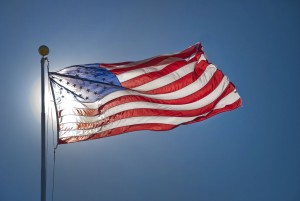Veterans Need Humanist and Progressive Outreach

The past twenty years have seen veterans continue to be one of the most respected groups in America. “Support the Troops” is a refrain powerful for fundraising, politics, and media efforts. The stewards of this power are the Veterans Service Organizations (VSOs), the charitable organizations who claim to represent the twenty million veterans in America. The strongest VSOs are the Veterans of Foreign Wars and the American Legion, and an understanding of the policies of those organizations show a great need for humanist outreach to veterans.
The American Legion’s 2012 political platform included sentiments like, “Activists aim to distort and twist the core values of patriotism, morality, and religion that gave birth to our nation, under God. They aim to kick God out of our public squares,” and “The American Legion is dedicated to combating the secular cleansing of our American heritage.” In 2010, the VFW closed down its PAC reportedly because of Democratic endorsements and Tea Party power in the organization. The VFW has also denied the Military Association of Atheists & Freethinkers (MAAF) a vendor table at its national convention. (In fact, the Legion doesn’t usually respond to MAAF.) These religious and political biases are especially concerning given the Congressional Charter each group enjoys. Progressively-minded veterans should certainly work from within these powerful organizations, but they will need support.
Organizations that support these progressive and secular minorities do exist; the organization I head, the Military Association of Atheists & Freethinkers, supports progressives and conservatives equally but specializes in supporting the secular community. Another organization, VoteVets, specializes in energizing and representing the progressive veterans base. However, VoteVets does not provide community like VFW or Legion posts. Disabled American Veterans, Veterans for Peace, and others seem to avoid overt bias and are welcoming to all—at least all that fit their niche. (Veterans for Peace in particular seems more prevalent in local humanist communities, but their more pacifist approach can, in my experience, be anti-military and sometimes even anti-troop.) But all of these groups struggle to compete with the ubiquitous presence and massive political power of the VFW and the Legion.
But there is also a strong trend of veterans opting out of the VFW or the Legion. They enjoy activity groups and sports clubs that fit their need for secular community and seem to leave veterans organizations to older conservatives already in power. That means there is a great opportunity for secular and humanist groups to capture this community and give them a voice.
Humanist groups locally should keep in mind that despite the conservative and religious voice of prominent veterans groups, there are many veterans eager for a community that better represents their values. I’ve travelled across the country and found a strong presence of veterans in local groups. At last month’s Freethought Day celebrations in Sacramento, nearly half of the assembled crowd were veterans and several were active duty military personnel.
Humanist groups should take advantage of that existing veteran core among their membership. Give them a voice with events for veterans and veteran signatures on letters to the editor. Give them leadership to encourage other veterans to come out and meet other civilians and veterans of like mind.
And while these voices will strengthen military efforts, they will strengthen all of our efforts by undercutting the “Veteran = Religious Conservative” mentality the VFW and Legion portray. The American Humanist Association fights against religious shrines masquerading as war memorials in California and Maryland among other places. The AHA also argues for humanist support from chaplains. Veterans can strengthen these arguments—as well as arguments on issues including foreign policy, the environment, gun responsibility, and social justice. Veterans are respected, and we should respect and amplify their voices in our communities.
Unfortunately, these monolithic VSOs represent the admittedly conservative veteran culture, but also extreme conservative Christian values. As the humanist community considers the veteran community, we must remember that progressive and humanist veterans not only exist, but are starved for community and voice.
